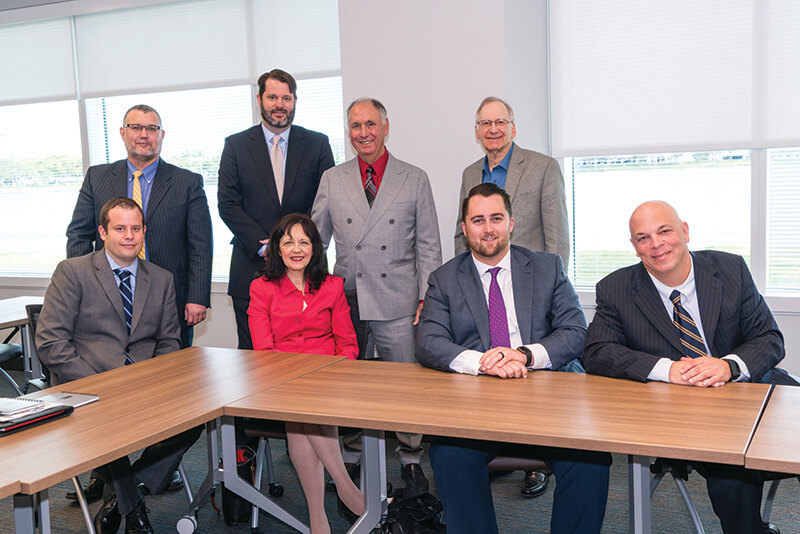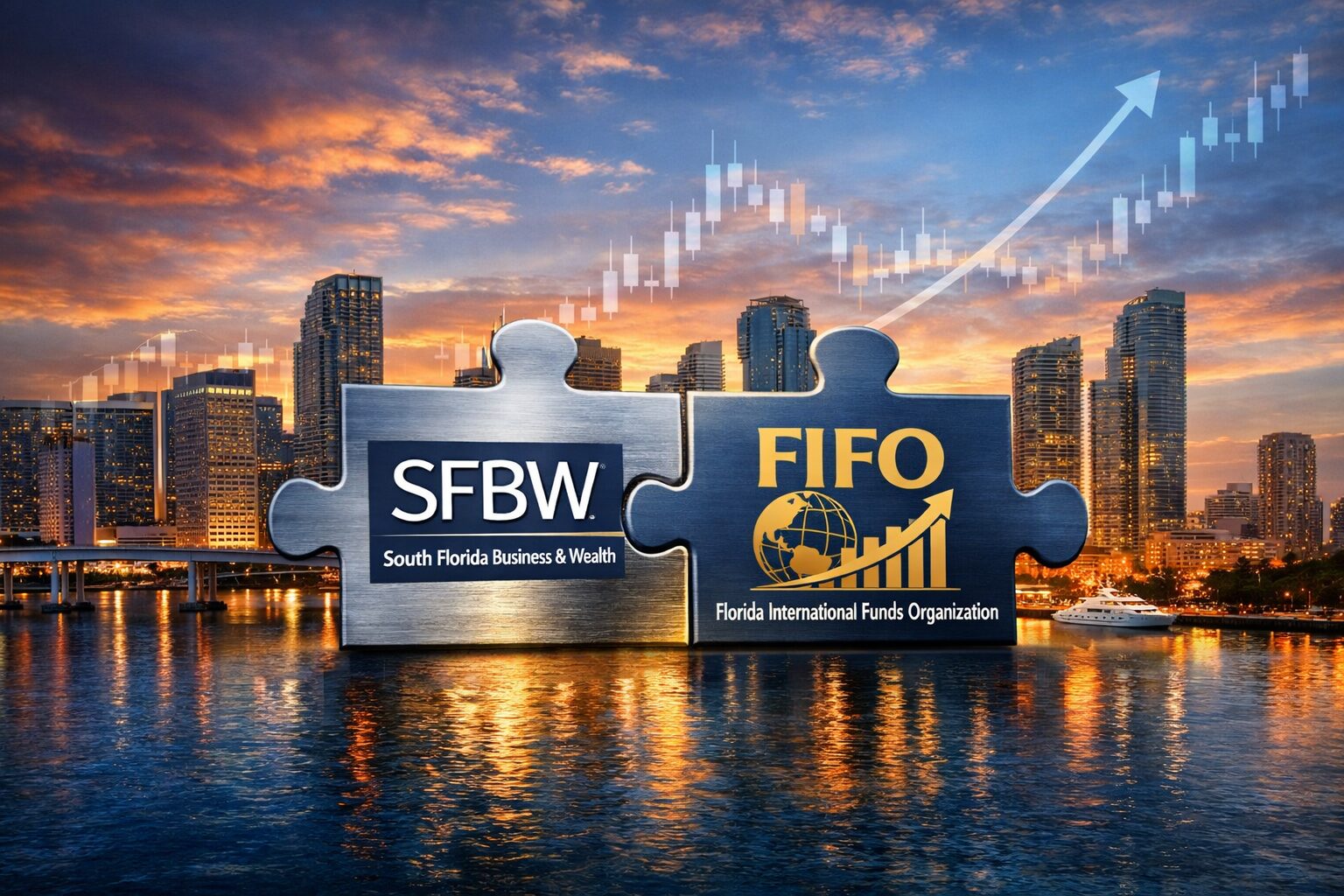Powered By

For a story accompanying the latest entry in SFBW’s series of lists, some of the region’s top CPAs convened to talk shop and share insights about litigation support accounting practices during a roundtable discussion.
The panelists:
• Marta Alfonso, principal of management advisory services and CPA at MBAF.
• Eric Santa Maria, partner at Verdeja, De Armas & Trujilo.
• Steven Wolf, partner and practice leader at Cherry Bekaert.
• Stewart Appelrouth, principal at Appelrouth, Farah & Co.
• John Heller, director at Marcum.
• Byron Brown, principal at Kaufman Rossin.
• Alan Fiske, managing director at Fiske & Co.
• Matthew James, partner at Ellrich, Neal, Smith & Stohlman.
SFBW Editor-in-Chief Kevin Gale moderated the discussion, which took place at FirstBank’s executive office in Miami’s Blue Lagoon office park. The following transcript has been edited for brevity and clarity.
What is litigation support, and what do you do?
Appelrouth: Litigation support is providing information and analysis to attorneys, judges, arbitrators, clients and other triers of facts, such as jurors, to help in settling a case or going through a full trial and figuring out what happened.
Wolf: Ultimately for us, it’s really where the intersection of law and accounting converge. We take complex information and make it easy to understand. We typically provide analysis from an independent perspective.
Fiske: We are educators. When I started out many years ago in litigation, I remember an attorney who didn’t understand the difference between a tax return and a financial statement. So, we really taught him all the economic aspects of the case. Our job is to educate the judge and the trier of facts.
Heller: It’s also about educating your client, generally the plaintiff or the defendant that you’re helping represent with counsel. They can believe that they have a very strong claim, but when you get down into the granularity of the actual facts, their claim may not be as strong. We step in and educate them and the attorney, so that they can know whether they can go into mediation or what’s going to happen at a trial, which is very important.
Do you find sometimes when you educate the client that the course they planned to take, say, going to a trial ends up not being the course they take?
Heller: Yes, more often than not.
Wolf: The client will approach their counsel before you are involved. And they’ll say, “I’ve got a $10-million problem.” But what they forget to tell you about are the top-line gross sales. They are not looking at what they actually lost in earnings. What we do is try to bring reality to the problem to, hopefully, allow the parties to resolve it. Because if two good experts have the same data, we should get to a similar answer, but it doesn’t always start that way.
Appelrouth: It’s interesting, because it’s not just the clients you have to bring down to reality, it’s the lawyers as well, because they have a certain perception of their case. Really good lawyers are realistic, and before they say anything, they usually want to have some form of forensics look at it and give them some input.
In general, what the steps are in discovery that includes forensics and litigation support? How does this process unfold?
Appelrouth: If you have a family law matter or divorce case, it’s one thing, and if you have economic damages, there are different types of processes. The first step in the process, after you’ve discussed this with the lawyers, is you find out the facts of the case. After you determine what kind of case it is, you put together documents that you need, such as general ledgers or actuarial tables or specific types of actuarial tables in certain cases of wrongful death. And you get with the client to make a determination as to the documentation.
Brown: I think a lot of it depends on what stage we are engaged. One thing we’ve observed as of late, is that it seems that the courts are pushing the action a lot quicker. These days, a lot of judges are not giving extensions on cases. I’ve found lately that, a lot of times, we’ve been getting calls three or four weeks before a report is due. And when we get brought in at that point, our hands are tied, because we can only work with what we have. And we only have a few weeks to do it. We’ve found it makes everything more efficient if you can bring the expert in early, like, at the time the complaint is filed. Then we can really help pinpoint the discovery that we need and what we will be most helpful for our case. Also if you bring us in early, it allows us to focus on the items that are the real important issues in the case. And it makes it cheaper for the client.
Alfonso: What I think has been a fundamental shift in the industry over the past five years is that you see offers being given with limited litigation budgets. What they tend to do is wait until they have to get the expert. Why? Because they might still be trying to settle the case or they are getting into discovery. I think ideally it is better to have you in upfront.
Heller: By limiting us from the discovery process, it limits our ability to reach conclusions and make opinions.
Appelrouth: There’s a big difference between a federal and a state case because under federal rules, there are discovery cutoffs and they are more formal than the state cases. If somebody is coming to you with a week to go on a federal case, you can’t do it.






How has electronically stored information and advancements in technology changed the way forensic and litigation support advisory professionals provide services?
Alfonso: ESI deals with the body of data that is stored within an electronic format. It can be financial data, it can be documents, a body of emails when you are dealing with transactional history and that can very important for certain cases where you need the context of what the parties talked about, intended and did at that time.
James: If you had 100 boxes of documents, you had to sort through them all and make a huge mess in the room, looking for certain things. Now, we can instead have PDF, Word, Excel documents and search the files for certain words. You can find things in a fraction of the time. Metadata can help. If you can get a copy of somebody’s hard drive and you have a copy of the business’ hard drive, you can go in there and see when things were created, who created them, when they changed them and what happened.
Fiske: We had one case where they delivered about 12 banker boxes of data. And we kept insisting that we wanted electronic data. Otherwise, we would have spent four or five times more on the case.
Wolf: Say you’re on a criminal case —you might look at all sorts of devices. In a labor case, we looked at the GPS in the employees’ vehicles because it gave multiple stamps, identifying where they were and when. The technology that’s available to us today, you probably don’t know the half of what we can do to find information. All the swipes that we use, whether it’s a customer card at Costco or an ATM, can be tracked. You can find the who, what, where. The “where” is really important when you are trying to identify someone telling the truth or not. We help lawyers figure this out, using digital forensics and other tools.
Appelrouth: What’s just as important is that judges have become more familiar with electronic data. Not more than five years ago, if you went in front of a judge and you said something like, “I would like to have the data from QuickBooks in an electronic format,” you would have all kinds of objections. The judges would think that we could just get the paper trail. With the advent of artificial intelligence, we can find information that we couldn’t find before. And it saves clients money.
Heller: Twenty years ago, the expectation was, even if you had a computer system, people would keep files. Today, most businesses, even small businesses, are paperless. So paper is only a small subset. You need the ESI to analyze the whole data.
Say I’m a business and someone sues me. How quickly do they instruct you on document retention? How does that unfold?
Alfonso: Typically, a lawyer who is representing you will give you a litigation instruction folder. They will tell you to retain all documents, and they will tell you what you want to scope out and what it is you need to retain. In a financial matter, they are going to talk to you about all your financial records. When you hire a lawyer, they will help the client through that process. Same if you were dealing with a personal litigation, when you go to a lawyer.
Brown: We had a case in which internal counsel was handling a litigation at a very large company. One of the financial persons had to testify that they had put documents on a CD-ROM and passed it onto the general counsel’s office and then somebody had deleted their hard drive. Our lawyer looked into it and determined that the CD-ROM disappeared. The judge determined that they did spoil evidence. In trial, the jury were read something, saying: “The defendant damaged this evidence. It’s not available. We don’t know what it says, but you can only assume that it was harmful to them.” The impact that has on a jury, even if there was nothing negative there, is probably very substantial.
What role do judges play in the scope of litigation discovery and fields such as electronic records such as an employee’s cell phone? Are there any privacy concerns that are at play?
Appelrouth: The key issue is what you just said: It’s privacy. A lot of employers today don’t have personnel manuals, and, without those, you don’t have policies. Even those that do have policies, it’s not just privacy, but it’s the expectation of privacy. And if employees, for example, are not put on notice, then it makes a difference. As case law is evolving on things like cell phones, it matters who is paying for the cell phone. Maybe it’s your phone, but is the employer paying for that monthly charge? Are you on call all the time, using that cell phone? Are you receiving data from the cell phone? The judges are becoming more and more aware that today we are in a digital world.
Fiske: We are finding that judges now are much more inclined to say, “Turn over all of the electronic data. Turn over the native format.” So, we are getting better cooperation with the judges. ♦














